Disaster of biblical proportions strikes America
By Charlene Muhammad -National Correspondent- | Last updated: Sep 12, 2017 - 12:56:44 PM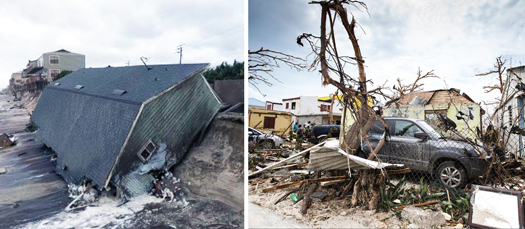
Hurricane Irma left a path of destruction in its wake. Photo via St. Johns County Fire Rescue House, Florida/Facebook (R) This Sept. 7 photo provided by the Dutch Defense Ministry shows storm damage in the aftermath of Hurricane Irma, in St. Maarten. Irma cut a path of devastation across the northern Caribbean, leaving thousands homeless after destroying buildings and uprooting trees. Signifi cant damage was reported on the island that is split between French and Dutch control. Photo: AP/Wide World photos
|
Hurricane Irma brings pain, trauma, destruction unseen in modern history
Nuclear hurricane. Storm of the Century. Monster storm.
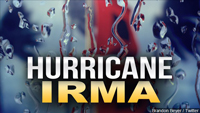 |
These unimaginable terms were used to describe the force and power of Hurricane Irma which has engulfed the entire State of Florida and then moved into South Carolina and Georgia.
Irma terrorized the entire state of Florida as a well-organized hurricane maintaining winds of 185 mph. Irma left nearly seven or eight million people without power, and wreaked other unprecedented havoc, starting first in the Caribbean.
Charles Clave of Naples, Fla., is a Christian evangelist. He evacuated with his family, including his 84-year-old wheelchair bound mother.
He told them, “We need to get out of here. It is life altering. I’m too old and I don’t have time to be holding doors and hiding in the closet and not knowing if I’m going to make it out of there. It’s frightening.”
He’s been through several hurricanes, the most devastating being Andrew which devastated Florida in 1992.
“Once the storm starts, oh my God. It sounds like a hundred trains. … I looked out the window and I couldn’t see nothing but water. I smelled the ocean, and my uncle and I hid in the bathroom while the bathroom walls was breathing in and out, expanding, expanding,” Mr. Clave told The Final Call.
He said he’s never prayed so hard before or since and the experience during Hurricane Andrew was so traumatic his girlfriend at the time miscarried.
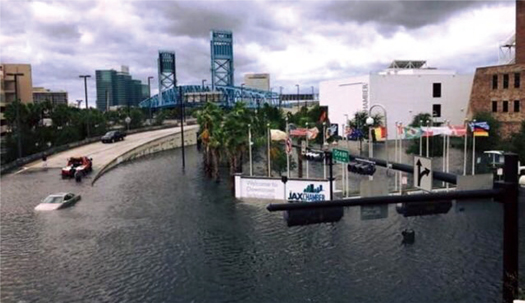
Flooding in Jacksonville, Florida from Hurricane Irma. Photo via Jacksonville Sheriff’s Office/Facebook
|

Damage in the Florida Keys after Hurricane Irma. (R) Hurricane Irma aftermath in Florida, Sept. 11.
|
“The Minister gave divine guidance,” said Student Minister Patrick Muhammad of the Nation of Islam mosque in Miami after speaking with the Honorable Minister Louis Farrakhan of the Nation of Islam as Irma drew nearer.
“Everything that he said is happening,” said Patrick Muhammad. “I literally almost dropped the phone when the Minister said to me directly for us, this is pushing as a Category 5 but it may go from a 6 even to a 7, and sure enough, here comes the media saying that they’re talking about a 6, one that could even go beyond a 6.”
“The Honorable Minister Louis Farrakhan was the first one, God’s divinely guided man, who said that to us,” Min. Muhammad continued.
Min. Farrakhan’s messages have been consistent, and unwavering.
“Now, as we are talking, there are a lot of raindrops falling in Houston. Don’t you ever laugh when you see Nature doing its work under the direction of the God that I am talking to you about. Into each life, some rain must fall; [but as] the song says, ‘too much has fallen in mine.’ Too much rain is a curse—though we can’t live without rain. But our teacher, Elijah Muhammad, named four great judgments that would come against America, and the first one was ‘unusual rain,’ ” he noted during a keynote address in Atlanta Aug. 27 as Hurricane Harvey battered the fourth largest city in the United States.
He has also grown more emphatic in his warnings that the forces of nature are God’s weapons against America and that these disasters will continue as part of fulfilment of scripture and God’s choice of Black people today, fulfilling the prophecy of the children of Israel in the Bible.
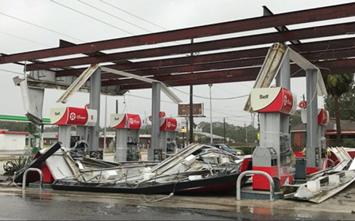
Gas station awning destroyed off Edgewood Avenue in Jacksonville Florida from Hurricane Irma. Photos: MGN Online
|
“But God has chosen us to be His people, and He delights in fighting the enemy. According to the history of the former people, He delighted Himself by going forth against them when they exceeded the limit. So it is with America. They must be separated. America will not agree to see the Negro separated from her until she has suffered divine punishment, as Pharaoh suffered.”
“Let me tell you what my teacher told me,” said Min. Farrakhan. “Whether you know it or not, America is a preserved area: No bomb is going to fall here, because The God has you here—and the White man knows he’s keeping you a hostage, because God is after you. … Your time to serve these people is up; you’re going to have to come up out of here. It’s your time, now,” said Min. Farrakhan during an August 20 lecture entitled, “Seek Refuge in Allah,” delivered from Mosque Maryam in Chicago.
“Mr. Trump, the God is after America for her evils done to His people. You have a chance to relieve yourself of some of the heaviness of the Judgment that is against you by letting my people go,” Min. Farrakhan said.

This photo provided by the Monroe County Sheriff’s Office shows the wreckage of a truck wrapped around a tree near 98th Street and Highway 1 in Marathon, Fla., in the Florida Keys on Sept. 9. Authorities say they are investigating whether Hurricane Irma's wind and rains contributed to the fatal crash. (R) A palm tree lays on a car after the passage of Hurricane Irma, near the shore in Marigot, on the island of St. Martin, Sept. 9. The island is divided between French St. Martin and Dutch Saint Maarten. Photos: AP/Wide World photos
|
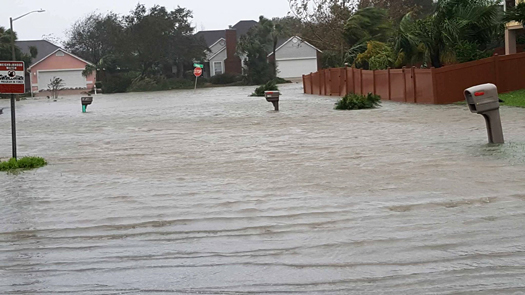
The aftermath of Hurricane Irma has left massive amounts of flooding in the U.S. and Caribbean. Photo via St. Johns County Fire Rescue House, Florida / Facebook
|
Surviving Hurricane Irma
Early estimates of Irma’s costs could reach $125 billion.Monique Caradine recently moved to Puerto Rico from Chicago. She weathered Irma with her son and husband.
Just having to secure potentially damaging furniture, coconuts, preparation in and of itself was stressful, especially on the heels of Hurricane Harvey, she said.
“When the local authorities begin to tell you that you must prepare or evacuate if you can, you must begin to stock up on water, make sure your generator has gas, keep your children home from school, have a safe place in your home, all of these things begin to cause the pressure and the stress to mount,” she said.
They felt the effects of the storm, barricaded behind storm shutters, unable to see.
“You could hear the wind. You could hear the rain, but you just don’t know what’s going on outside, so to say the least, I am suffering right now from my own minor case of post-traumatic stress,” Ms. Caradine told The Final Call.
With FEMA still dealing with the aftermath of Hurricane Harvey in Houston, Irma will test the agency’s ability to handle two major disasters at the same time.
Florida Power and Light warned it will take weeks before electricity is fully restored.
Irma at one time was the most powerful hurricane ever recorded in the open Atlantic, with a peak wind speed of 185 mph.
Given its size and strength, it’s the most devastating hurricane ever to hit Florida.
“Pray, pray for everybody in Florida,” Gov. Rick Scott said on Fox News Sunday as more than 160,000 people statewide waited it out in shelters.
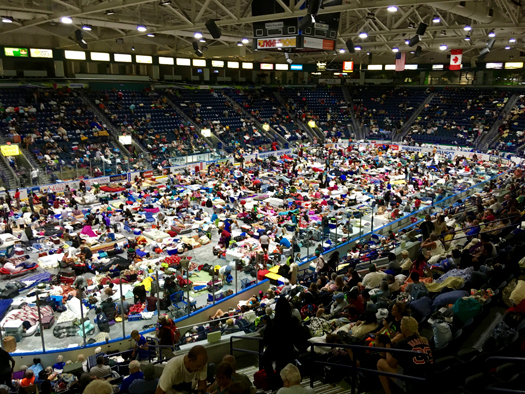
Evacuees fill Germain Arena, which is being used as a fallout shelter, in advance of Hurricane Irma, in Estero, Fla., Sept. 9.
|
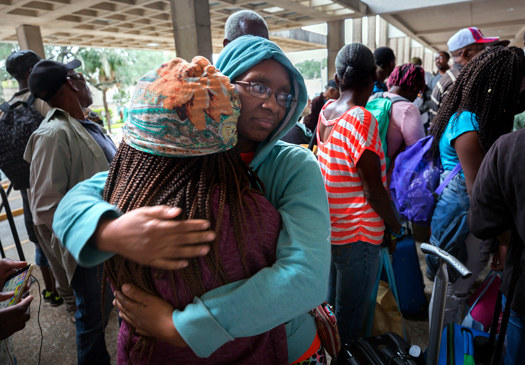 |
In the low-lying Keys, where a storm surge of over 10 feet was recorded, appliances and furniture were seen floating away, and Monroe County spokeswoman Cammy Clark said the ocean waters were filled with navigation hazards, including sunken boats and loose vessels.
A Miami woman who went into labor was guided through delivery by phone when authorities couldn’t reach her because of high winds and street flooding. Firefighters later took her to the hospital.
In downtown Miami, two of the two dozen construction cranes looming over the skyline collapsed in the wind. City officials said it would have taken about two weeks to move the massive equipment.
Curfews were imposed in Miami, Tampa, Fort Lauderdale and much of the rest of South Florida, and some arrests of violators were reported. Miami Beach barred outsiders from the island.
Fort Lauderdale police arrested nine people they said were caught on TV cameras looting sneakers and other items from a sporting goods store and a pawn shop during the hurricane.
Nearly 7 million people in the Southeast were warned to evacuate, including 6.4 million in Florida alone.
Gretchen Blee, who moved with her husband to Naples from Long Island, New York, after Superstorm Sandy in 2012 heavily damaged their beach home, took cover in a hotel room as Irma raged.
“I said let’s go and live the good life in paradise,” she said. “And here we are.”
“Once this system passes through, it’s going to be a race to save lives and sustain lives,” Federal Emergency Management Agency chief Brock Long said on Fox News Sunday.
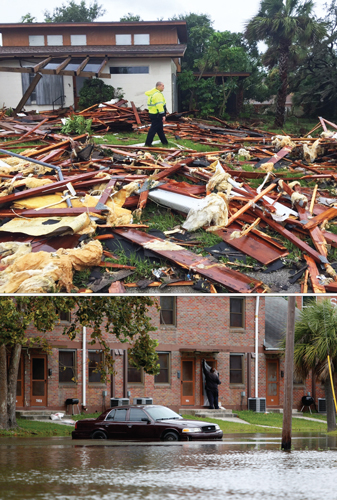
(Top) Palm Bay officer Dustin Terkoski walks over debris from a two-story home at Palm Point Subdivision in Brevard County, Fla., after a tornado touched down on Sept. 10. (bottom) A Charleston, S.C. resident puts plastic up over his apartment door as a car rests in floodwaters near East Bay Street in Charleston, S.C., Sept. 10. Photos: AP/Wide World photos
|
Florida’s governor activated all 7,000 members of the Florida National Guard, and 10,000 guardsmen from elsewhere were being deployed.
Irma killed one person in Georgia as storm surge and rain flooded coastal communities Sept. 11. Winds sent trees crashing onto homes and the world’s busiest airport in Atlanta canceled hundreds of flights as the storm’s punch was felt statewide despite its weakened status as a tropical storm.
The city of Savannah, on Georgia’s coast, was evacuated for the second time in less than a year because of the storm, and the National Weather Service in Peachtree City confirmed that Atlanta—more than 250 miles inland from either the Atlantic or Gulf coasts—was under a tropical storm warning for the first time.
The storm fatality occurred in southwest Georgia, where Irma’s center crossed over from Florida. Tropical storm winds reached more than 400 miles from its center, giving its powerful gusts and drenching rains a far reach.
Storm surge and rainfall arriving at high tide Sept. 11 swamped communities along Georgia’s 100-mile coast. On Tybee Island east of Savannah, Holland Zellers was heading home to grab a kayak so he could reach a home where his mother had taken shelter near the beach.
“In the street right now, the water is knee-to-waist deep,” Mr. Zeller said.
Shawn Gillen, Tybee Island’s city manager, said waters appeared to be receding quickly but the flooding was extensive on the island of more than 3,000 residents.
The tidal surge also sent water and damaged boats rushing ashore for more than three blocks into downtown St. Marys just north of the Georgia-Florida state line, said St. Marys police Lt. Shannon Brock.
Almost all of Georgia was under a tropical storm warning.
A similar warning covered parts of South Carolina and most of eastern Alabama, where schools and businesses were closed. Alabama Emergency Management Agency meteorologist Jim Stefcovich said strong winds could linger in the state.
About 800 flights had been canceled at Hartsfield-Jackson Atlanta International Airport, which remained operational Sept. 11 as its staff monitored storm conditions with help from the Federal Aviation Administration, airport spokesman Andrew Gobeil said.
But more than 800,000 Georgia Power and EMC customers mostly in coastal and south Georgia were without power. Alabama Power said there were 12,000 outages mostly in the southeastern area of the state.
In Atlanta, falling trees and limbs may pose the most significant threat to life and property.
Georgia’s coast was largely empty after evacuations were ordered for the second time in less than a year. The coast’s nearly 540,000 residents fled last October ahead of Hurricane Matthew, which caused an estimated $500 million in damage and killed three people.
The National Weather Service said flooding rains were a major concern, with 8 to 15 inches of rainfall predicted in southeast Georgia at Final Call press time. Downtown Savannah saw winds strong enough to make palm trees bend and sway.
Further inland in Lowndes County near the Georgia-Florida line, firefighters rescued occupants of a few homes struck by falling trees, said county spokeswoman Paige Dukes. No serious injuries were reported. With wind gusts reaching 70 mph officials ordered a daytime curfew for the 112,000 residents of Lowndes County, which includes Valdosta.
Metropolitan Atlanta Rapid Transit Authority suspended all bus and rail services and would decide later whether to resume operations Sept. 12, spokesman Erik Burton said.
(The Associated Press contributed to this report.)
No comments:
Post a Comment